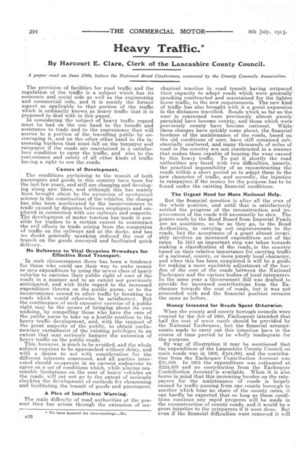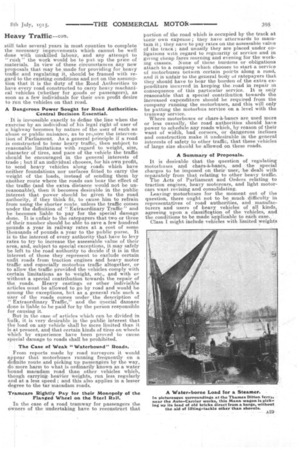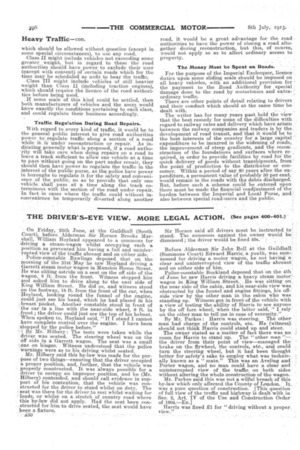Heavy Traffic.*
Page 6

Page 7

Page 8

If you've noticed an error in this article please click here to report it so we can fix it.
By Harcourt E. Clare, Clerk of the Lancashire County Council.
A paper read on June 29th, befoie the National Road Conference, convened by the County Councils Association.
The provision of facilities for road traffic and the regulation of the traffic is a subject which has its economic and social side as well as the engineering and commercial side, and it is mainly the former aspect as applicable to that portion of the traffic which is ordinarily known as heavy traffic that it is proposed to deal with in this paper. In considering the subject of heavy traffic regard must be had on the one hand to the benefit and assistance to trade and to the convenience that will accrue to a portion of the travelling public by encouraging it, and on the other other hand to the increasing burdens that must fall on the taxpayer and ratepayer if the roads are maintained in a satisfactory condition to carry the traffic, and also to the Convenience and safety of all other kinds of traffic having a right to use the roads.
Causes of Development.
The conditions pertaining to the transit of both .passengers and goods in this country have been for the last few years, and still are changing and developing along new lines, and although this has mainly been brought about by the extension of mechanical science in the construction of the vehicles, the change has also been accelerated by the inconveniences to trade caused by disputes between employers and employed in connection with our, railways and seaports. The development of motor traction has.made it possible for traders to a certain extent to counteract the evil effects to trade arising from the congestion of traffic on the railways and at the docks, and has no doubt generally speaking: reduced the cost of transit on the goods conveyed and facilitated quick 'delivery.
No Reference to Vital Occasion Nowadays for Effective Road Transport.
• In such circumstances there has been a tendency for those who could see their way to make money or save expenditure by using the newer class of heavy vehicles to exercise their public right of -user of the roads in a manner and to an extent not previously anticipated, and with little regard to the increased expenditure thrown on the public purse, 'or to the inconvenience caused to other traffic by breaking up roads which would otherwise be satisfactory. But the continuance of such excessive exercise of a public right may be the means of bringing about its own undoing, by compelling those who have the care of the public purse to take up a hostile position to the heavy traffic development, and, with the support of the great majority of the public, to obtain parliamentary curtailment of the existing privileges to an extent that may seriously hamper the extension of heavy traffic on the public roads.
This, however, is much to be avoided, and the whole subject requires to be approached without delay, and with a desire to act with consideration for the different interests concerned, and all parties interested should co-operate in an earnest endeavour to' agree on a set of conditions which, while placing reasonable limitations on the user of heavy vehicles on the roads, will yet not go to the extent of seriously checking the development of methods for cheapening and facilitating the transit of goods and passengers.
A Plea of Insufficient Warning.
The main difficulty of road authorities at the present. time has arisen through the extension of me chanical traction in road transit having outpaced their capacity to adapt roads which were generally speaking constructed and maintained for the lighter horse traffic, to the new requirements. The new kind of traffic has also brought with it a great expansion in the distances travelled. Roads which so far as the, user is concerned were previously almost purely'. parochial have become county, and those which were previously county have become national. While these changes have quickly come about, the financial burdens of the maintenance of the roads, based on the old conditions of user, have still remained substantially unaltered, and many thousands of miles of road in the country are not constructed in a manner that makes them capable of bearing the wear caused • by this heavy traffic. To put it shortly the road authorities are faced with two difficulties, namely, the practical impossibility of so reconstructing the roads within a short period as to adapt them to the new character of traffic, and secondly, the injustice to ratepayers if the money for the purpose has to be found under the existing financial conditions.
The Urgent Need for More National Help.
But the financial question is after all the crux of the whole position, and until that is satisfactorily settled the progress of the reconstruction and improvement of the roads will necessarily be slow. The grants made by the Road Board from Imperial Funds are an assistance, so far as they go, to the Road Authorities, in carrying out improvements to the roads, but the acceptance of a grant almost invariably involves an increased. expenditure out of the rates. In 1913 an important step was taken towards making a classification of the roads, in the country based on their relative importance for carrying traffio of a national, county, or more purely local character, and when this has been completed it will be a guide for making a more equitable adjustment of the burden of the cost of the roads between the National Exchequer and the various bodies of local ratepayers. In the same year a. Government Bill was drafted to provide for increased contributions from the Exchequer towards the cost of roads, but it was not proceeded with and the financial position remains the same as before.
Money Intended for Reads Spent Otherwise.
When the county and county borough councils were created by the Act of 1888, Parliament intended that half the cost of main roads should be provided by the National Exchequer, but the financial arrangements made to carry out this intention have in the course of time proved to be wholly inadequate for the purpose.
By way of illustration it may be mentioned that the expenditure of the Lancashire County Council on main roads was in 1906, £144,000, and the contribution from the Exchequer Contribution Account was
61,000. In 1915 the expenditure was estimated at 2224,000 and no contribution from the Exchequer Contribution Accountfis available. When it is also borne in mind that this increasina-b burden on the ratepayers for the maintenance of -roads is largely caused by traffic passing from one county borough to another which bear no share of the county rates, it can hardly be expected that so long as these conditions continue any rapid progress will be made in the reconstruction of county roads, and it would be a gross injustice to the ratepayers if it were done. BRt even if the financial difficulties were removed it will
still take several years in most counties to complete the necessary improvements which cannot be well done with Unskilled labour, and any attempt to " rush " the work would be to put up the price of materials. In view of these circumstances any new proposals that may be made for providing for heavy traffic and regulating it, should be framed with regard to the existing conditions and not on the assumption that it is the duty of the Road Authorities to have every road constructed to carry heavy machanical vehicles (whether for goods or passengers), as soon as a few individuals for their own profit desire to run the vehicles on that road.
A Dangerous Power Sought for Road Authorities. Central Decision Essential.
It is imnossible exactly to define the line when the exercise by an individual of his legal right of user of a highway -becomes by nature of the user of such an abuse or public nuisance, as to require the intervention of Parliament. As a general principle if a road is constructed to bear heavy traffic, then subject to reasonable limitations with regard to weight, size, character of tires, and pace of the vehicle the traffic should be encouraged in the general interests of trade ; but if an individual chooses, for his own profit, to send heavy vehicles along roads which have neither foundations nor surfaces fitted to carry the weight of the loads, instead of sending them by another route where the roads can bear the effect of the traffic (and the extra distance would not be unreasonable), then it becomes desirable in the public interest that power should be given to the road authority, if they think fit, to cause him to refrain from using the shorter route, unless the traffic comes under the definition of "_ Extraordinary Traffic" and he becomes liable to pay for the special damage done. It is unfair to the ratepayers that two or three of their number should be able to save a few hundred pounds a year in railway rates at a cost of some thousands of pounds a year to the public purse. It is to the interest of every authority that have to levy rates to try to increase the assessable value of their area,and, subject to special exceptions, it may safely be left to the road authority to decide if it is in the interest of those they represent to exclude certain unfit roads from traction engines and heavy motor traffic and especially motorbus traffic altogether, or to allow the traffic provided the vehicles comply with certain limitations as to weight, etc., and with or without a special contribution towards the repair of the roads. Heavy castings or other indivisible articles must be allowed to go by road and would be among the exceptions, but as a general rule such a User of the roads comes under the description of " Extraordinary Traffic," and the ifnecial damage done is liable to be paid for by the person responsible for causing it.
But in the case of articles which can be divided in bulk, it is very desirable in the public interest that the load on any vehicle 'shall be more limited than it is at present, and that certain kinds of tires on wheels Which by experience have been proved to cause special damage to roads shall be prohibited.
The Case of Weak " Waterbound" Roads.
From reports made by road surveyors it would appear that motorbuses running frequently on a definite route and picking up passengers by the way, do more harm to what is ordinarily known as a water bound macadam road than other vehicles which, though carrying heavier weights, run less regularly and at a less speed ; and this also applies in a lesser degree to the tar macadam roads.
Tramcars Rightly Pay for their Monopoly of the Flanged Wheel on the Steel Rail, In the case of a road tramway for passengers the owners of the undertaking have to reconstruct that
portion of the road which is occupied by the track at tneir own expense ; they have afterwards to maintain it ; they nave to pay rates on the assessable value of the track ; and usually they are placed under obligations with regard to regularity of service and in giving cheap fares morning and evening for the working classes. IN one of these burdens or obligations attach to a company which chooses to start a service of motorbuses betwen certain points along a road, and it is unfair to the general body of ratepayers that they should have to bear the burden of the extra expenditure incurred in keeping the road in repair in consequence of this particular service. It is only reasonable that a special contribution towards the increased expenditure should be required from the company running the motorbuses, and this will only be putting the motorbus service on a level with the tramway service. Where motorbuses or chars-à-bancs are used more or less casually, the road authorities should have power to schedule any roads which, by reason of their want of width, bad corners, Or dangerous inclines and construction make it undesirable in the general interests of safety to other traffic, that these vehicles of large size should be allowed on these roads.
A Summary of Proposals.
It is desirable that the question of regulating motorbuses and chars-gybancs, and the special charges to be imposed on their user, be dealt with separately from that relating to other heavy traffic.
'The Acts of Parliament and Orders relating to traction engines, heavy motorcars, and light motorcars want revising and consolidating. Leaving motorbuses for the moment out of the question, there ought not to be much difficulty in representatives of road authorities, and manufacturers and users of heavy vehicles of all kinds, agreeing upon a classification of the vehicles, and the conditions to be made 'applicable to edeh case. • Class I might include vehicles with limited weights which should be allowed without question (except in some special circumstances), to use any road.
-Class II might include vehicles not exceeding some greater weight, but in regard to these the road authorities should have power to exclude their user (except with consent) of certain roads which for the time may be scheduled as unfit to bear the traffic.
Class III might include vehicles of still heavier weight than Class II (including traction engines), which should require the licence of the road authorities before being used.
. If some scale of this _kind could be settled, then both manufacturers of vehicles and the users would know. exactly the conditions pertaining to each class, and could regulate their businese accordingly.
Traffic Regulation During Road Repairs.
With regard to every kind of traffic, it would be to the general public interest to give road authorities power to: regulate traffic along a section of a road while it is 'under reconstruction or repair. As indicating generally what is proposed, if a road authoerity will take care when doing repairs on a road to leave a track sufficient to anew one vehicle at a time to pass without going on the part under repair, they should then have power to regulate the traffic in the interest of the public purse, as 'the police have power in boroughs to regulate it for.the safety and convenience of the public, so as to provide that only one vehicle shall pass at a time along the track coterminous with the section of the road under repair. In fact in caSes where the traffic Could without inconvenience be temporarily diverted along another
road, it would be a great advantage for the road authorities to have the power of closing a road altogether during reconstruction, but this, of course, would not apply so as to affect ordinary access to property.
The Money Must beSpent on Roads.
For the purpose IA the Imperial Exchequer, licence . duties upon some sliding scale should be imposed on all heavy vehicles, with an additional provision for the payment to the Road Authority for special damage done to the road by motorbuses and extra-, ordinary traffic.
There are other points of detail relating to drivers and their conduct which should at the same time be
dealt with. • • The writer has for many years past held the view that the best remedy for some of the difficulties with regard to railway rates and delivery whichhave ariS6n
between the railway companies and traders is by the. development of road transit, and that it Wouldbe to the best interests of the country for a large capital expenditure to be incurred in the widening of iciads, the improvement of steep gradients, and the recoil-.. struction of the foundations and surfaces where re, quired, in order to provide facilities by road for the quick delivery of goods without transhipment, from the point of production to the distributor or consumer. Within a period of say 20 years after. the ex-. penditure, a permanent value of probably 50 per cent.. would remain in the roads' with the debts discharged.. But, before such a scheme could be ,enter.pd upon there must be made the financial readjustment of the burden between the Imperial and Local Purse, laud also between special road-users and the public.






















